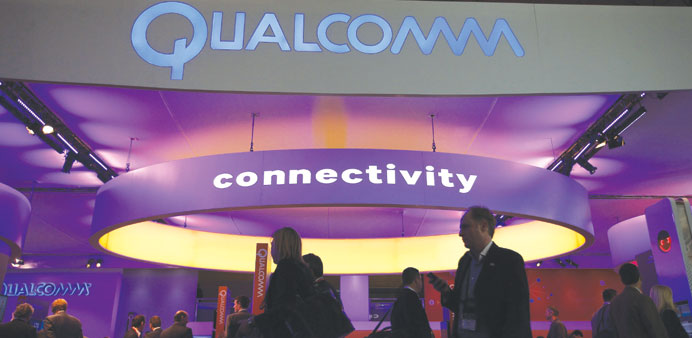Visitors walk past a Qualcomm stand at the Mobile World Congress in Barcelona in this file photo. China’s antitrust regulator has confirmed that the mobile chipmaker has a monopoly, a newspaper reported yesterday.
Reuters/Beijing
China’s antitrust regulator has confirmed that Qualcomm Inc, one of the world’s biggest mobile chipmakers, has a monopoly, the state-run Securities Times newspaper reported yesterday, as Qualcomm’s chief executive held talks in China.
The regulator, the National Development and Reform Commission (NDRC), is investigating Qualcomm’s local subsidiary after it said in February the US chipmaker was suspected of overcharging and abusing its market position in wireless communication standards, allegations which could see it hit with record fines of more than $1bn.
The Securities Times report, based on unidentified sources it said were close to the NDRC, did not say whether the regulator had determined that Qualcomm had abused its monopoly.
Angela Zhang, an antitrust expert at King’s College London, said the report was a “loose expression that the NDRC has gathered facts that Qualcomm has abused its dominant position.”
“It seems likely that the decision will be announced soon,” she said, noting that having a monopoly alone is not a violation of China’s anti-monopoly law.
Qualcomm CEO Steven Mollenkopf, who launched a $150mn “strategic venture fund” in China yesterday, declined to take questions from reporters. A spokeswoman travelling with Mollenkopf also declined to comment on the newspaper report.
The NDRC declined to provide immediate comment.
China is a key market for Qualcomm, accounting for nearly half of its revenue. The country is the world’s biggest market for smartphones and is preparing to roll out faster 4G mobile networks this year.
While most of Qualcomm’s revenue comes from selling chips that enable phones to communicate with carrier networks, most of its profit comes from licensing patents for its widespread CDMA cellphone technology. The Securities Times report said the NDRC was probing Qualcomm’s local sales data and that Qualcomm’s Aberle has been communicating with the NDRC over issues relating to the anti-monopoly investigation.
Analysts say that the process of confirming sales data is common in the late stage of an anti-trust investigation, and that the NDRC is likely calculating the extent of fines.
Qualcomm President David Aberle, speaking as the company reported a lower-than-expected outlook for the September quarter on Wednesday, said “some loss would be probable” from the probe.
“We are really not in a position to be able to estimate what that might look like, we just believe whatever the resolution may be, will likely include some form of payment,” he added.
Aberle said the investigation concerns Qualcomm’s licensing business as well as interactions between its licensing business and its chipset business, and that the probe was making it harder to negotiate new 4G licences with manufacturers in China.
Qualcomm was also struggling to collect licensing revenue from some device makers in China, including a growing number of local manufacturers it has done little or no business with in the past, Aberle added. Some Chinese customers of San Diego-based Qualcomm, such as electronics giant TCL Corp, complain the firm is using its dominant market position to charge high patent fees on its chipsets.
Industry experts, however, say the NDRC, which is also the government’s main economic planning body, is trying to lower domestic costs as China rolls out the 4G mobile networks.
The Securities Times said Qualcomm was charging lower royalties for patents to undercut competitors who have similar technology and maintain market share. The report also said that Qualcomm, as the only provider of chips for high-end phones, can dictate those fees. During the launch of the China fund, Qualcomm CEO Mollenkopf defended the company’s licensing programme, saying the $30bn spent in research and development over the company’s lifetime had allowed it to spread its technology in China.
“It’s really why anybody that signs up on a license, actually does it voluntarily - because it is a way of leveraging all of that R and D,” Mollenkopf said. Under China’s six-year-old anti-monopoly law, the NDRC can impose fines of between 1 and 10% of a company’s revenues for the previous year. Qualcomm earned $12.3bn in China for its fiscal year ended September 29, or nearly half of its global sales.
Qualcomm has previously said it is cooperating with the investigation.

